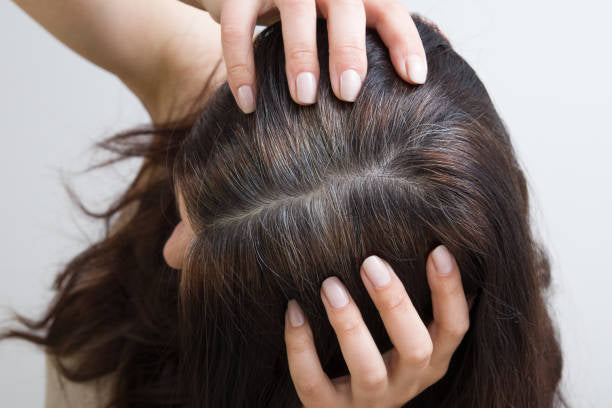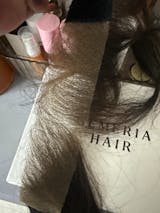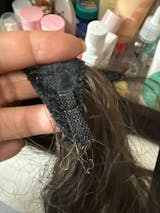Hair fall in female, a prevalent concern in India, stems from a complex interplay of factors such as genetics, hormones, diet, stress, and lifestyle. While shedding around 50-100 strands daily is normal, excessive hair fall can indicate an underlying issue. Nutritional deficiencies, especially in vitamins and minerals, it is a common hair fall reasons in female. Stress triggers hormone imbalances that impact hair health. Nurturing hair with a balanced diet, gentle care routines, stress management, and herbal remedies can help counter hair fall.
If persistent, seeking professional advice ensures tailored solutions. With proactive measures and a holistic approach, you can effectively address hair fall reasons and promote healthy, vibrant hair. Also, excessive hair fall can lead to thinning hair and baldness. This happens when excess hair fall surpasses the normal shedding rate, leading to thinning hair and, in severe cases, eventual baldness. As hair strands weaken and miniaturise, hair density diminishes, resulting in visibly thinner patches on the scalp. If left unchecked, prolonged excessive hair fall can contribute to the progression of baldness, impacting overall hair volume and appearance.

In this blog, we'll delve into the causes of hair fall in female, provide insights into understanding this issue, and offer practical tips for preventing hair loss. Let's get started on the journey to healthier, stronger hair!
Understanding Hair Growth
Hair undergoes a natural growth cycle, consisting of the anagen (growth), catagen (transitional), and telogen (resting) phases. Understanding this cycle helps us comprehend normal hair shedding. On average, people lose around 50-100 strands of hair daily, which is considered normal for an Indian individual.
The natural hair growth cycle consists of three main phases with their distinct features as follows:
- Anagen (Growth Phase):
- Hair actively grows from the follicle.
- Lasts for 2 to 7 years.
- New hair replaces the old one.
- Catagen (Transition Phase):
- Hair stops growing.
- Lasts for about 10 days.
- Follicle shrinks and detaches from the blood supply.
- Telogen (Resting Phase):
- Hair rests in the follicle.
- Lasts for around 3 months.
- Old hair is pushed out by new hair growth.
After telogen, the cycle restarts with the anagen phase. On average, about 85-90% of hair is in the anagen phase, while the remaining hair is in catagen or telogen.
Common Hair Fall Reasons in Female

Various factors have a role in contributing to hair fall. Let us understand them in detail:
- Genetics: The genes we inherit from our parents play a substantial role in determining hair health. If your family has a history of hair loss, you might be more prone to experiencing it as well.
- Hormonal Imbalances: Conditions like Polycystic Ovary Syndrome (PCOS) can lead to hormonal imbalances in the body. Increased levels of androgens, often seen in PCOS, can trigger hair loss in individuals, particularly in a male-pattern baldness manner.
- Nutritional Deficiencies: Inadequate nutrition can weaken hair. Deficiencies in key vitamins and minerals such as biotin, iron, zinc, and vitamins A and D can impact the hair growth cycle, leading to hair fall.
- Stress: The modern lifestyle's stressors, be it emotional or physical stress, can disrupt the normal hair growth cycle. Stress may push hair follicles into a resting phase, causing them to shed more than usual.
- Scalp Conditions: Poor scalp health can exacerbate hair fall. Conditions like dandruff, characterised by an itchy and flaky scalp, can weaken hair roots. Fungal infections on the scalp can also cause inflammation and hair shedding.
Understanding these contributing factors is vital in addressing hair fall concerns effectively. A comprehensive approach that includes a balanced diet, stress management, proper hair care, and seeking medical advice when necessary can help maintain healthy locks.
Hair Fall Preventing Tips
Now let us look at some popular practices to prevent hair fall.
- A balanced diet rich in proteins, vitamins (especially Vitamin D and Biotin), and minerals (like Iron and Zinc) is crucial for hair health.
- Adopting gentle hair care practices, such as avoiding tight hairstyles and using mild products, helps.
- Managing stress through relaxation techniques like yoga and meditation is beneficial.
- Herbal remedies like amla, fenugreek, coconut oil and essential oils have long been valued in Indian culture for their hair-strengthening properties.
Home Remedies for Hair Fall

Home-made remedies offer a natural and cost-effective approach to tackling hair fall. Ingredients like aloe vera, coconut oil, onion juice, and fenugreek seeds are rich in nutrients that can nourish the scalp, strengthen hair follicles, and promote healthy hair growth, without the risk of harsh chemicals.
Aloe vera's natural enzymes stimulate hair growth, while onion juice provides sulphur to nourish hair follicles. Coconut milk is rich in essential fats and proteins that promote hair health, and amla is a potent source of Vitamin C, which aids collagen production. Fenugreek seeds can help in combating hair fall due to their high protein content.
Consulting a Professional
Seek professional advice if your hair fall is severe or persistent. A dermatologist can diagnose underlying causes and recommend appropriate treatments or medications. Medical interventions like PRP therapy or hair transplants can be considered under expert guidance.
Caring for Your Scalp

Caring for your scalp is essential as it forms the foundation for healthy hair. Regular cleansing, exfoliation, and maintaining a balanced pH level can prevent scalp issues like dandruff, dryness, and oiliness. A healthy scalp fosters strong hair follicles, ensuring optimal conditions for hair growth and minimising hair fall.
Scalp massages enhance blood circulation, promoting hair growth. Using mild shampoos and conditioners helps maintain a healthy scalp environment. Avoid using hot water, as it can strip the scalp of natural oils.
Lifestyle Changes for Healthy Hair
Embracing positive lifestyle changes can significantly enhance hair health. A balanced diet rich in nutrients nourishes hair follicles, promoting growth and reducing hair fall. Managing stress through relaxation techniques ensures a healthier scalp and hair. Prioritising regular exercise improves blood circulation, delivering essential nutrients to hair roots. Proper sleep allows cells to regenerate, contributing to strong hair. Avoiding harsh hair treatments and using gentle products protects hair from damage. Overall, adopting these lifestyle changes supports vibrant hair and minimises hair fall.
Conclusion
Hair fall can be distressing, but with patience and consistent efforts, it can be managed effectively. Embrace a holistic approach that includes a balanced diet, proper hair care, and a healthy lifestyle. By understanding the causes and implementing preventive measures, you can enjoy strong, luscious locks that reflect your overall well-being. Remember, healthier hair begins with healthier habits!
And if you want to keep your hair thinning lines and bald patches hidden, using hair wigs and extensions is always a good idea. Gemeria offers top hair accessories and products for just this!


















